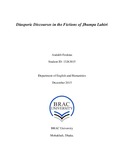| dc.contributor.advisor | Chowdhury, Rukhsana Rahim | |
| dc.contributor.author | Ferdous, Andalib | |
| dc.date.accessioned | 2016-02-09T15:59:33Z | |
| dc.date.available | 2016-02-09T15:59:33Z | |
| dc.date.copyright | 2015 | |
| dc.date.issued | 2015-12 | |
| dc.identifier.other | ID 13263015 | |
| dc.identifier.uri | http://hdl.handle.net/10361/4988 | |
| dc.description | This thesis is submitted in partial fulfillment of the requirements for the degree of Masters of Arts in English, 2015. | en_US |
| dc.description | Cataloged from PDF version of thesis. | |
| dc.description | Includes bibliographical references (page 36-38). | |
| dc.description.abstract | Man has always been in quest for a better life. Since the very beginning of the world till today’s advanced period the exploration continued. Man moves from one place to other in search for the comfort and prosperity. Often they leave their homelands to create a better future. Diaspora writing deals with this type of movements and reveals certain features that are similar to the experience. Jhumpa lahiri is one of the famous Indian American authors who are much-admired chronicler of the Bengali immigrant experience. Her works portrays the migrant’s experiences and their attachment to the homeland along with their urge to belong in the settled land for the betterment of the economic and social life. This paper will explore the various diasporic aspects in the fictions of Jhumpa lahiri especially the short story collections in Interpreter of Maladies (1999) and Unaccustomed Earth (2008) following her first novel The Namesake (2003). It is very significant that Jhumpa Lahiri is the child of Indian migrant and she thinks that the question of identity is always a difficult one for those who are culturally displaced and growing up in two worlds simultaneously. The condition of people living in diaspora is always a dual state which creates confusion and clashes. Identity and sense of dislocation, alienation and other issues that expatriates deal with. Diaspora is all about the creation of new identities in a new cultural space. Lahiri’s works manifest the notion of being uprooted from homeland and also put emphasize on the quest for blending in the host country. Her characters try to become a “new- self” without really letting go of the “old – self” and thus creates stories that display universal appeal. Lahiri pursues contradictory ways in handling the issues of diasporic life which makes her writing a delicate and poised voice within the Indian and world diasporic literature. | en_US |
| dc.description.statementofresponsibility | Andalib Ferdous | |
| dc.format.extent | 38 pages | |
| dc.language.iso | en | en_US |
| dc.publisher | BRAC University | en_US |
| dc.rights | BRAC University thesis are protected by copyright. They may be viewed from this source for any purpose, but reproduction or distribution in any format is prohibited without written permission. | |
| dc.subject | English and humanities | en_US |
| dc.subject | Jhumpa Lahiri | en_US |
| dc.title | Diasporic discourses in the Fictions of Jhumpa Lahiri | en_US |
| dc.type | Thesis | en_US |
| dc.contributor.department | Department of English and Humanities, BRAC University | |
| dc.description.degree | M.A. in English | |

